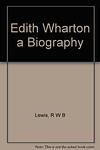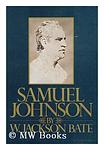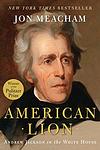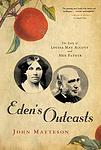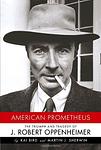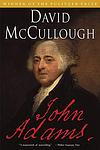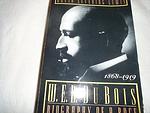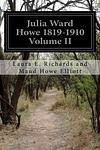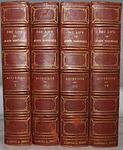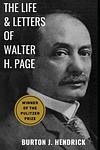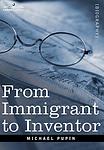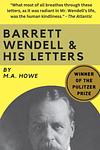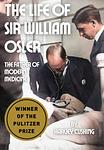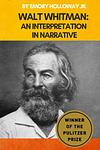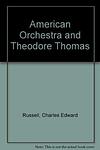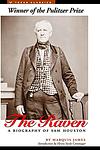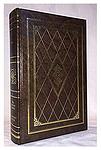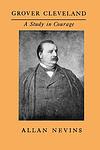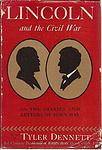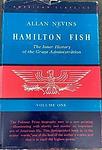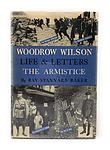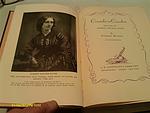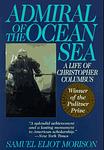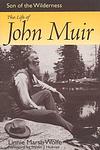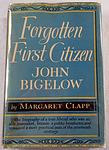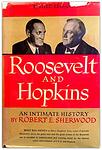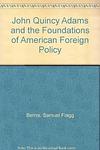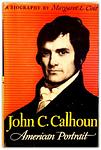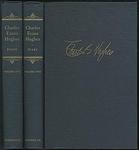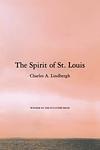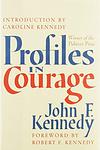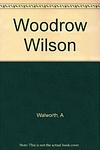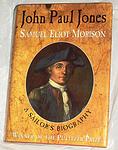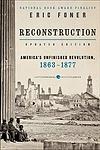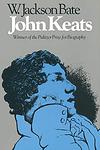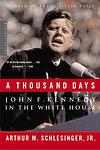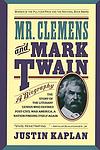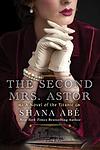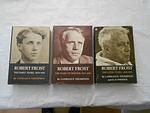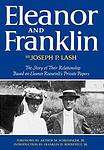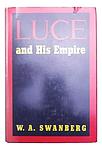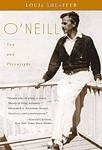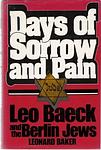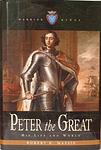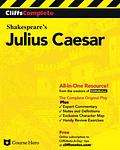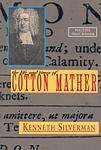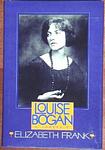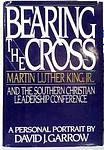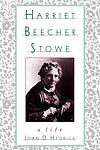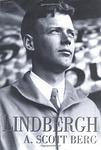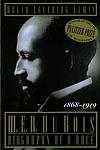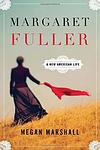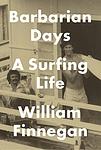Pulitzer Prize for Biography or Autobiography
This is one of the 273 lists we use to generate our main The Greatest Books list.
-
The Education of Henry Adams by Henry Adams
"The Education of Henry Adams" is an autobiographical account that explores the changes in society and politics during the 19th and 20th century from the perspective of an individual who is both a product and critic of that era. The narrative is structured around the author's self-perceived failure to understand or adapt to these changes, despite his privileged education and social status. The book is a reflection on the author's life, his attempts to make sense of the world around him, and his struggle to reconcile his traditional upbringing with the rapid advancements of the modern world.
-
Henry James by Leon Edel
This book is an in-depth biography of one of the most influential writers of the 19th century. The author meticulously details the life and work of the subject, from his early years in New York and his extensive travels in Europe, to his eventual settling in England and his career as a writer. The book delves into his relationships with family, friends, and fellow writers, as well as his own struggles with identity and sexuality. It also provides a comprehensive analysis of his novels, novellas, and short stories, highlighting his unique narrative style and his exploration of complex themes such as consciousness, morality, and social class.
-
Edith Wharton: A Biography by R. W. B. Lewis
This biography provides a detailed account of the life of renowned American author Edith Wharton. It explores her privileged upbringing in New York, her tumultuous marriage, her complex relationships, and her successful writing career. The narrative also delves into her experiences living abroad in France during World War I, her humanitarian efforts, and her eventual recognition as the first woman to win the Pulitzer Prize for Literature. The book offers a comprehensive insight into Wharton's life, her works and the society she lived in, painting a vivid picture of a woman ahead of her time.
-
Samuel Johnson by Walter Jackson Bate
This biography provides an in-depth look into the life of Samuel Johnson, an 18th-century English writer who contributed greatly to English literature as a poet, essayist, moralist, literary critic, biographer, and lexicographer. The book explores Johnson's struggles with depression, fear of death, and various physical ailments, as well as his intellectual prowess and his impact on literature. It also delves into his relationships with other notable figures of his time, offering a comprehensive portrait of a complex and influential man.
-
The Rise of Theodore Roosevelt by Edmund Morris
This biography explores the early life and career of Theodore Roosevelt, detailing his journey from a sickly child to a robust young man who embraced a range of interests from nature to politics. It chronicles his personal life, including the tragic death of his wife and mother on the same day, and his professional life, from his time as a New York assemblyman to his role in the Spanish-American war. The book concludes with Roosevelt's unexpected ascension to the presidency after the assassination of President McKinley.
-
The Power Broker by Robert Caro
This book is a biography of Robert Moses, a powerful figure in New York City and state politics, who wielded immense influence over the urban development of the area in the mid-20th century. Despite never holding elected office, Moses was responsible for the creation of numerous parks, highways, bridges, and public works throughout the city and state. The book delves into the methods Moses used to achieve and maintain his power, his impact on the city, and the controversial legacy he left behind.
-
American Lion: Andrew Jackson in the White House by Jon Matteson
This book provides a comprehensive and detailed account of Andrew Jackson's presidency, offering insight into his personal life, political career, and the significant impact he had on the United States. It explores his controversial decisions, such as his stance on slavery and the Indian Removal Act, as well as his contributions to the expansion of presidential power. The book also delves into Jackson's tumultuous personal life, including his marriage and the scandal that surrounded it, painting a vivid picture of one of America's most influential and polarizing figures.
-
Eden's Outcasts by Jon Matteson
"Eden's Outcasts" is a biography that explores the lives of American author Louisa May Alcott and her father, Amos Bronson Alcott. The book delves into their personal and professional lives, detailing their relationships, struggles, and achievements. It provides a comprehensive look at Louisa's journey to becoming a renowned author and her father's role as a progressive educator and philosopher. The book also examines the impact of their unconventional family life and the influence of Transcendentalism on their work.
-
The Most Famous Man in America by Debby Applegate
"The Most Famous Man in America" is a comprehensive biography of a 19th-century minister who became a national celebrity through his progressive views on religion, slavery, and women's rights. Despite his fame and influence, he faced numerous personal and professional challenges, including a high-profile adultery trial, which led to his downfall. The book provides a detailed exploration of his life, his impact on American society, and the changing cultural and political landscape of his time.
-
American Prometheus by Kai Bird, Martin J. Sherwin
"American Prometheus" is a biography that explores the life of the physicist who led the Manhattan Project, which developed the atomic bomb during World War II. This book offers a comprehensive look at his personal life, scientific achievements, and the moral implications of his work. It also delves into his political activism, his blacklisting during the McCarthy era, and his struggle with depression and cancer.
-
de Kooning by Mark Stevens, Annalyn Swan
This book offers an in-depth study into the life and works of a renowned Dutch-American Abstract Expressionist artist. The authors delve into his troubled childhood in Rotterdam, his immigration to America, and his struggles with alcoholism and Alzheimer's in his later years. They also explore his artistic journey, from his early work as a house painter to his rise as a leading figure in the New York art scene, detailing his unique style that blended abstraction and figuration. The book also highlights his tumultuous relationships, particularly with women, and how these influenced his art.
-
Khrushchev: The Man and His Era by William Taubman
This biography offers an in-depth look into the life and political career of Nikita Khrushchev, the former leader of the Soviet Union. The book delves into Khrushchev's rise to power, his controversial role in the Cuban Missile Crisis and his relationships with other world leaders. It also explores his efforts to reform the Soviet Union, his eventual downfall, and his lasting impact on the country and the world.
-
Master of the Senate by Robert Caro
This book is the third volume in a series that details the life and career of a prominent American politician. It focuses on his time in the U.S. Senate, detailing how he used his skills in persuasion and manipulation to gain power and influence. The book explores his major legislative achievements, his relationships with other politicians, and his impact on American politics. It also provides an in-depth look at the workings of the Senate and the political climate of the time.
-
John Adams by David McCullough
This biography delves into the life of John Adams, the second president of the United States. The book tells the story of Adams' journey from his childhood in Massachusetts, his education at Harvard, his marriage to Abigail, his role in the Continental Congress, his diplomatic duties in Europe, his presidency, and his retirement. It also explores his complex relationships with contemporaries like George Washington and Thomas Jefferson. The author uses correspondence and diaries to provide an in-depth look at Adams' personal and political life, highlighting his integrity, patriotism, and political foresight.
-
W.E.B. Du Bois: The Fight for Equality and The American Century by David Levering Lewis
This biography delves into the life of W.E.B. Du Bois, a prominent African-American civil rights activist and scholar. It explores his tireless fight for racial equality in the United States during the 20th century. The book chronicles his role as a founder and leader of the NAACP, his influence in the Harlem Renaissance, his controversial advocacy for black separatism, and his later years as an expatriate in Ghana. It paints a comprehensive picture of Du Bois as a key figure in the struggle for civil rights and the shaping of the American century.
-
Vera by Stacy Schiff
"Vera" is a biography that explores the life of Vera Nabokov, the wife of a famous Russian novelist. The book delves into the complexities of their relationship and Vera's role as her husband's muse, editor, protector, and the force behind his success. It provides a detailed look at their life together, from their meeting in 1920s Europe, through their escape from the Nazis, to their life in America. The book also highlights Vera's intelligence, strength, and unwavering support for her husband's career.
-
Julia Ward Howe by Laura E. Richards, Maud Howe Elliott
This biography provides an in-depth look into the life of Julia Ward Howe, a prominent abolitionist and social activist best known for writing "The Battle Hymn of the Republic." The book explores Howe's early life, her marriage, and her growing involvement in social reform movements, including women's suffrage. It also details her literary contributions and her enduring legacy in American history.
-
Benjamin Franklin, Self-Revealed by William Cabell Bruce
"Benjamin Franklin, Self-Revealed" is an in-depth biography that explores the life, accomplishments, and personal philosophies of one of America's founding fathers, Benjamin Franklin. The book delves into Franklin's humble beginnings, his rise to prominence, his scientific and political contributions, and his lasting impact on American culture and society. The author uses Franklin's own writings and correspondences to provide a comprehensive and intimate portrait of this influential figure, revealing his thoughts on a wide range of subjects, from politics and science to morality and human nature.
-
The Life of John Marshall by Albert J. Beveridge
"The Life of John Marshall" is an in-depth biography that explores the life and career of the influential American statesman and jurist. The book covers Marshall's early life, his service in the Revolutionary War, his time in Congress and as Secretary of State, and most importantly, his tenure as the fourth Chief Justice of the United States Supreme Court. The author delves into Marshall's significant contributions to American constitutional law, his role in shaping the Supreme Court's powers, and his impact on the development of the American legal system.
-
The Americanization of Edward Bok by Edward Bok
"The Americanization of Edward Bok" is an autobiography that chronicles the author's journey from his birth in the Netherlands to his emigration to America at the age of six, and eventually becoming a successful magazine editor. The narrative explores the cultural clashes, struggles, and triumphs he experienced as he sought to assimilate into American society. The author emphasizes the importance of perseverance, hard work, and education in achieving the American dream, providing a timeless tale of immigrant experience in the United States.
-
A Daughter of the Middle Border by Hamlin Garland
This memoir chronicles the life of the author's family as they move from Wisconsin to Iowa, then to South Dakota during the late 19th century. The narrative focuses on the hardships and challenges of pioneer life, the author's own evolution as a writer, and the significant role his sister played in his life. The book offers a poignant depiction of the American frontier and its influence on the people who lived there.
-
The Life and Letters of Walter H. Page by Burton J. Hendrick
This book provides an insightful biography of Walter H. Page, a prominent journalist and diplomat in the early 20th century. It is a compilation of his personal and professional correspondence, offering readers an intimate look into his life and thoughts. The book covers his early career in journalism, his role as the U.S. ambassador to the United Kingdom during World War I, and his passionate advocacy for education reform in the South. It also explores his relationships with influential figures of his time, providing a unique perspective on historical events and issues.
-
From Immigrant to Inventor by Michael I. Pupin
"From Immigrant to Inventor" is an autobiographical account of a Serbian immigrant who arrives in the United States with nothing, but through hard work and determination becomes a successful inventor, scientist, and professor at Columbia University. The narrative highlights the struggles, triumphs, and contributions of immigrants in America, demonstrating the author's belief in the American dream. His inventions and scientific contributions, particularly in the field of telephony and radiology, play a significant role in the book, as well as his deep-rooted patriotism and gratitude towards his adopted country.
-
Barrett Wendell and His Letters by M. A. Dewolfe Howe
"Barrett Wendell and His Letters" is a biographical account that explores the life and work of a renowned professor and author through his personal letters. The book provides an intimate look into his private life, his teaching career at a prestigious university, his literary contributions, and his relationships with prominent literary figures of his time. The letters, filled with wit, wisdom, and personal reflections, offer a unique perspective on his character and the cultural and intellectual environment of his era.
-
The Life of Sir William Osler by Harvey Cushing
This biography explores the life and career of Sir William Osler, a Canadian physician and one of the four founding professors of Johns Hopkins Hospital. Detailing his contributions to the medical field, the book highlights Osler's innovative teaching methods, his advocacy for a strong doctor-patient relationship, and his belief in lifelong learning for medical professionals. The biography also delves into Osler's personal life, his upbringing, education, and the influence he had on modern medicine.
-
Whitman by Emory Holloway
This biography offers an in-depth exploration of the life and works of renowned American poet Walt Whitman. The book delves into Whitman's personal life, his relationships, his experiences during the Civil War, and his influence on American literature. It also provides a comprehensive analysis of Whitman's poems, including his most famous work, "Leaves of Grass," shedding light on his unique style and themes.
-
The American Orchestra and Theodore Thomas by Charles Edward Russell
This book is a comprehensive biography of Theodore Thomas, a prominent conductor who played a pivotal role in the development of American orchestras in the 19th century. The author provides an in-depth look into Thomas's life, his contributions to the music world, his vision for American orchestras, and how he transformed the American music scene. The book also explores the broader context of the American orchestra during this time period, shedding light on its evolution, challenges, and triumphs.
-
The Training of an American: The Earlier Life and Letters of Walter H. Page by Burton J. Hendrick
"The Training of an American: The Earlier Life and Letters of Walter H. Page" is a comprehensive biography that delves into the early life and correspondence of Walter H. Page, a prominent journalist, publisher, and diplomat during the early 20th century. The book provides an in-depth look at his upbringing, education, and formative years, as well as his career in journalism and publishing, and his role as ambassador to the United Kingdom during World War I. The narrative is enriched by Page's personal letters, which offer a unique insight into his thoughts, opinions, and experiences.
-
The Raven by Marquis James
"The Raven" is a historical biography that focuses on the life of Sam Houston, a key figure in the history of Texas. The book provides a comprehensive account of Houston's life, from his childhood spent with the Cherokee Indians, his military career, his time as governor of Tennessee, his significant role in the Texas Revolution, to his tenure as the President of the Republic of Texas. The narrative is enriched with personal anecdotes, political intrigue, and detailed descriptions of historical events, offering readers an in-depth understanding of this influential character and the era he lived in.
-
Charles W. Eliot by Henry James
This biography delves into the life and career of Charles W. Eliot, an influential figure in American education who served as the president of Harvard University for forty years. The book provides an in-depth look at Eliot's progressive educational philosophies, his efforts to transform Harvard into a leading research university, and his significant impact on American higher education. The author also explores Eliot's personal life, highlighting his character, values, and the experiences that shaped his approach to education.
-
Theodore Roosevelt by Henry F. Pringle
This biography provides a detailed account of the life of Theodore Roosevelt, the 26th President of the United States. It delves into his personal and political life, shedding light on his progressive policies, his role in the Spanish-American War, his conservation efforts, and his post-presidential career. The book also explores Roosevelt's personality, his relationships, and his impact on American history, offering a comprehensive view of this influential figure.
-
Grover Cleveland by Allan Nevins
This biography provides an in-depth look at Grover Cleveland's life, his political career, and his two non-consecutive terms as President of the United States. The author delves into Cleveland's personal life, his rise in politics, his fiscal conservatism, and his commitment to reform and honesty. The book also examines the various challenges and controversies he faced during his presidency, including his opposition to high tariffs and imperialism, his support for the gold standard, and his struggle with the economic depression of the 1890s.
-
John Hay by Tyler Dennett
"John Hay" is a comprehensive biography that delves into the life and career of an esteemed American statesman, diplomat and private secretary to Abraham Lincoln. The book provides an in-depth exploration of Hay's role in shaping American foreign policy, notably his significant contributions during the Open Door Policy and the Panama Canal negotiations. It also sheds light on his personal life, relationships, and his journey from a humble background to becoming one of the most influential figures in American history.
-
R. E. Lee by Douglas Southall Freeman
"R. E. Lee" is a comprehensive biography that provides a detailed account of the life of the famed Confederate General Robert E. Lee. The book dives deep into his personal life, his military strategies, and his role in the American Civil War, offering a balanced and nuanced portrayal of Lee. It also explores his relationships, his character, and his post-war life, giving readers a well-rounded understanding of this significant figure in American history.
-
The Thought and Character of William James by Ralph Barton Perry
This book is an in-depth exploration of the life and philosophy of William James, a prominent psychologist and philosopher. The author delves into James' personal life, his upbringing, and his intellectual development, providing a comprehensive analysis of his philosophical beliefs, theories, and contributions to pragmatism. The book also offers a detailed examination of James' thoughts on subjects such as religion, psychology, and metaphysics. It serves as a valuable resource for those interested in understanding the mind and character of this influential thinker.
-
Hamilton Fish by Allan Nevins
This biography delves into the life of Hamilton Fish, a prominent political figure in the 19th century who served as a Governor of New York, a United States Senator, and U.S. Secretary of State. The book explores his significant contributions to American politics, including his efforts to establish the Alabama Claims, his role in the annexation of the Dominican Republic, and his work to maintain peace during the controversial 1876 presidential election. It provides an in-depth look at Fish's political career, personal life, and the historical context in which he operated.
-
Pedlar's Progress by Odell Shepard
"Pedlar's Progress" is a historical fiction novel that follows the life of a peddler in the early 19th century. The protagonist travels across America, selling his wares and engaging with a variety of characters along the way. As he navigates through different towns and landscapes, he experiences and observes the changing culture, economics, and politics of the time. The book provides a unique perspective on the early American experience, highlighting the struggles and triumphs of everyday people.
-
The Life of Andrew Jackson by Marquis James
This biography provides a detailed account of the life of Andrew Jackson, the seventh President of the United States, from his early childhood to his presidency. It explores his military career, his controversial presidency, his turbulent personal life, and his lasting impact on American politics and society. The book offers an in-depth look at his role in the War of 1812, his contentious relationship with the Bank of the United States, and his controversial policies regarding Native American tribes.
-
Benjamin Franklin by Carl Van Doren
This biography provides a comprehensive look at the life of Benjamin Franklin, a prominent figure in American history. The book delves into Franklin's diverse roles as a writer, scientist, inventor, diplomat, and statesman, providing a detailed account of his significant contributions, from his experiments with electricity to his role in drafting the U.S. Constitution. It offers a balanced portrayal of Franklin, highlighting not only his accomplishments but also his flaws and contradictions.
-
Woodrow Wilson, Life and Letters by Ray Stannard Baker
This book provides a detailed account of the life and letters of Woodrow Wilson, the 28th President of the United States. It explores Wilson's personal life, his political career, his ideologies, and his significant contributions to American history. The author uses Wilson's letters as a primary source, offering a unique insight into the former president's thoughts, feelings, and motivations. The narrative presents a comprehensive and intimate portrait of Wilson, from his early years to his time in the White House, and his post-presidential years.
-
Johnathan Edward by Ola Elizabeth Winslow
This book explores the life and work of Jonathan Edwards, a prominent American preacher, theologian, and missionary during the 18th century. The author delves into Edwards' personal life, his teachings, his role in the Great Awakening, and his significant influence on American Protestantism. The book also provides a comprehensive look at the social and religious climate of the time, offering readers a deeper understanding of Edwards' impact and legacy.
-
Crusader in Crinoline by Forrest Wilson
"Crusader in Crinoline" is a biography that tells the story of a woman named Hetty Cary, who was a prominent figure during the Civil War era. Known for her beauty and charm, she was also a staunch supporter of the Confederacy, using her social status to influence those around her. The book provides an in-depth look at her life, her role in the war, and the impact she had on the people she encountered.
-
Admiral of the Ocean Sea by Samuel Eliot Morison
This book is a comprehensive biography of Christopher Columbus, providing an in-depth exploration of his life, voyages, and discoveries. It delves into his navigation skills, his interactions with indigenous people, and his role in the colonization of the New World. The author, a renowned historian, combines historical facts with a narrative style, offering a detailed account of Columbus's expeditions, his struggles, and his achievements, thus painting a vivid picture of this complex and controversial figure in history.
-
The American Leonardo: The Life of Samuel F B. Morse by Carleton Mabee
This book is a comprehensive biography of Samuel F. B. Morse, a renowned American inventor and artist. It provides an in-depth look into Morse's life, detailing his contributions to the world, including the invention of the telegraph and the Morse code. The book also explores his lesser-known career as a painter, his involvement in politics, his personal life, and the struggles he faced along his journey. The narrative offers a balanced view of Morse, acknowledging his genius while also highlighting his flaws and controversies.
-
George Bancroft: Brahmin Rebel by Russel Blaine Nye
"George Bancroft: Brahmin Rebel" is a comprehensive biography that examines the life and career of George Bancroft, a prominent historian and statesman in 19th-century America. The book explores Bancroft's multifaceted roles as a historian, diplomat, and politician, his contribution to American education, and his influence on the development of American historical writing. It also delves into his personal life, his Brahmin background, and his rebellious nature that often put him at odds with his contemporaries.
-
Son of the Wilderness by Linnie Marsh Wolfe
"Son of the Wilderness" is a biography that chronicles the life and accomplishments of a renowned naturalist and conservationist. The book explores his early years growing up in the harsh wilderness, the experiences and influences that shaped his passion for nature, and his tireless efforts in advocating for the preservation of natural landscapes. The book also highlights his instrumental role in the establishment of the National Park Service and his enduring legacy in the field of environmental conservation.
-
The Autobiography of William Allen White by William Allen White
This memoir offers a detailed account of the life of a renowned American newspaper editor, author, and leader of the Progressive movement. It chronicles his experiences from his humble beginnings in Kansas, his rise to prominence in journalism, his political involvement, and his personal relationships. The book provides a unique insight into the author's views on significant historical events and figures, his dedication to the improvement of society, and his belief in the power of the press.
-
Forgotten First Citizen: John Bigelow by Margaret Clapp
"Forgotten First Citizen: John Bigelow" is a comprehensive biography of John Bigelow, a significant yet underappreciated figure in 19th-century American history. The book traces Bigelow's life from his humble beginnings to his influential roles as a journalist, diplomat, and statesman. It details his contributions to the abolitionist movement, his service as the U.S. Minister to France during the Civil War, and his efforts to establish the New York Public Library. The biography paints a vivid portrait of a man who was deeply committed to public service and intellectual pursuits, and whose legacy has been largely overlooked.
-
Roosevelt and Hopkins by Robert E. Sherwood
"Roosevelt and Hopkins" is a detailed exploration of the relationship between President Franklin D. Roosevelt and his closest advisor, Harry Hopkins, during World War II. The book provides an inside look at the political maneuverings and decision-making processes of the American administration during this crucial period. It paints a vivid picture of the complex personalities of these two men and their roles in shaping the U.S.'s response to the global conflict.
-
John Quincy Adams and the Foundations of American Foreign Policy by Samuel Flagg Bemis
The book is a comprehensive biography of John Quincy Adams, focusing on his significant role in shaping American foreign policy. It details Adams' early years, his time as a diplomat in Europe, his tenure as Secretary of State under James Monroe, and his presidency. The book also provides an in-depth analysis of Adams' philosophy and strategy in foreign affairs, particularly his vision of America as a beacon of liberty and his efforts to establish the country as a dominant force in the Western Hemisphere.
-
John C. Calhoun: American Portrait by Margaret Louise Coit
This biography provides a comprehensive view of John C. Calhoun, an influential American statesman and political theorist during the first half of the 19th century. It delves into his life, his role as a leader in the Democratic party, his service as Vice President to both John Quincy Adams and Andrew Jackson, and his strong advocacy for states' rights and slavery. The book also explores his complex personality, his political philosophies and his impact on the shape of the American nation.
-
Charles Evans Hughes by Merlo J. Pusey
This biography provides an in-depth look at the life and career of Charles Evans Hughes, a prominent figure in American politics during the early 20th century. It explores his roles as governor of New York, U.S. Secretary of State, Associate Justice and Chief Justice of the Supreme Court, and unsuccessful Republican candidate for President in 1916. The book offers valuable insights into Hughes' political philosophy, his contributions to constitutional law, and his influence on American foreign policy.
-
Edmund Pendleton 1721–1803 by David J. Mays
"Edmund Pendleton 1721–1803" is a comprehensive biography of the influential Virginian lawyer, politician, and judge. The book delves into the life of Pendleton, detailing his significant roles in the American Revolution and the founding of the United States. His contributions to the drafting of legal frameworks, his role in the Continental Congress, and his influence on the U.S. Constitution are all highlighted. The book also explores Pendleton's personal life and his enduring legacy in American history.
-
The Spirit of St. Louis by Charles Lindbergh
This book is a detailed personal account of a historic transatlantic flight in 1927 by a young aviator. The narrative describes the meticulous planning, the dangerous journey, and the worldwide acclaim that followed. The pilot’s courage, skill, and determination, along with his fascination with science and his love for flying, are vividly portrayed in this captivating memoir.
-
The Taft Story by William S. White
"The Taft Story" is a comprehensive biography of Robert A. Taft, a prominent Republican senator known for his conservative views and his influence in the mid-20th century American politics. The book provides an in-depth look into Taft's personal life, his political career, his unsuccessful presidential campaigns, and his notable contributions to the U.S. foreign and domestic policies. The author also explores Taft's political philosophy, his leadership style, and the impact of his legacy on the Republican Party.
-
Benjamin Henry Latrobe by Talbot Faulkner Hamlin
This biography provides a detailed look into the life and works of Benjamin Henry Latrobe, a significant figure in early American architecture. The book discusses Latrobe's contributions to the design of the United States Capitol, the Baltimore Basilica, and other notable buildings, as well as his role in improving U.S. infrastructure through his work on waterworks systems. It also delves into his personal life, including his relationships, struggles, and the impact of his work on his contemporaries and future generations of architects.
-
Profiles in Courage by John F. Kennedy
This book highlights the stories of eight U.S. Senators who displayed immense courage and integrity in the face of pressure from their parties and constituents. The author examines their acts of bravery and principle, often leading to severe consequences in their personal and political lives. The book aims to inspire readers with historical examples of political courage, emphasizing the importance of individual action for the collective good.
-
George Washington by Douglas Southall Freeman
This book offers a comprehensive biography of George Washington, delving into his life from his early years, his role in the French and Indian War, his leadership during the American Revolution, and his presidency. The author meticulously details Washington's military strategies, political maneuvers, and personal beliefs, painting a vivid picture of the man who became the first president of the United States. The book also provides an insight into Washington's private life, his relationships, and his struggles, presenting him as a flesh-and-blood human being rather than a historical figure.
-
Woodrow Wilson, American Prophet by Arthur Walworth
This book provides an in-depth exploration of the life and presidency of Woodrow Wilson, highlighting his religious upbringing and how it influenced his political philosophy and decisions. It details his early life, his time as a scholar and university president, and his tenure as the 28th President of the United States, focusing on his role in leading the country through World War I and his efforts to establish the League of Nations. The book also examines Wilson's progressive domestic policies and his vision for a new world order based on democracy and cooperation.
-
John Paul Jones by Samuel Eliot Morison
This book provides an in-depth biography of John Paul Jones, a Scottish-American naval hero during the American Revolutionary War. The author recounts Jones' life, from his early years in Scotland, his journey to America, his significant contributions to the U.S. Navy, to his later years in France. The book provides an insightful look into his naval strategies, his leadership style, and his tenacity which earned him recognition as a significant figure in American history.
-
Charles Sumner and the Coming of the Civil War by David Donald
This book provides an in-depth look at the life and political career of Charles Sumner, a prominent abolitionist and U.S. Senator during the years leading up to the American Civil War. It explores Sumner's passionate advocacy for the abolition of slavery, his role in the formation of the Republican party, and his influence on American politics during this turbulent period in history. The book also includes a detailed account of the infamous incident in which Sumner was physically attacked on the Senate floor by a pro-slavery congressman, an event that further escalated tensions between the North and South.
-
John Keats by Walter Jackson Bate
This book is a comprehensive biography of the English Romantic poet, John Keats. It delves into Keats's life, his relationships, his struggles with illness, and his development as a poet. The author provides a detailed analysis of Keats's poetry and letters, revealing the depth of his passion, his intellectual curiosity, and his commitment to creating poetry that was 'a living thing'. The book also explores the social, political, and cultural context of Keats's life, providing a rich understanding of the man and his work.
-
Henry Adams by Ernest Samuels
This biography provides an in-depth look at the life of Henry Adams, a prominent American historian and member of the Adams political family. It delves into his personal experiences, relationships, and intellectual pursuits, offering a comprehensive view of his contributions to American literature and history. The book also explores his complex personality and his struggles with depression, providing a humanizing portrayal of this influential figure.
-
A Thousand Days by Arthur M. Schlesinger, Jr
"A Thousand Days" is a comprehensive account of the presidency of John F. Kennedy, written by a close aide who had firsthand knowledge and access to the inner workings of the administration. The book delves into the policies, decisions, and the personal and political challenges faced by Kennedy during his short-lived presidency. It offers an in-depth analysis of his domestic and foreign policies, including the Cuban Missile Crisis, the civil rights movement, and his efforts to combat poverty. It also provides an intimate portrait of Kennedy as a person, shedding light on his personal life, character, and leadership style.
-
Mr. Clemens and Mark Twain by Justin Kaplan
This biography offers a dual portrait of Samuel Clemens, the man from Missouri, and Mark Twain, the literary icon. It delves into Clemens' personal life, his struggles, and his successes, as well as his transformation into Mark Twain, the witty and insightful author known worldwide. The book provides a comprehensive view of the man behind the pen, detailing his childhood, his work as a riverboat pilot, his travels, his family life, and his career as a writer.
-
Memoirs by George Frost Kennan
This memoir offers an intimate look into the life and career of a prominent American diplomat and historian, known for his significant role in shaping US foreign policy during the Cold War. The book provides a detailed account of his experiences in various diplomatic posts, his influence in developing the policy of containment against the Soviet Union, his views on nuclear weapons, and his critique of American foreign policy. It also shares personal reflections on his family, education, and personal life, giving readers a comprehensive understanding of his life and work.
-
The Man From New York: John Quinn and His Friends by Benjamin Lawrence Reid
"The Man From New York: John Quinn and His Friends" is a detailed biography of John Quinn, an influential lawyer, art collector, and patron of the arts in early 20th century New York. The book explores Quinn's relationships with key figures in the art and literary worlds, including W.B. Yeats, Ezra Pound, and Pablo Picasso. It also delves into his role in shaping modernism and his impact on the cultural and artistic landscape of the time.
-
Huey Long by Thomas Williams
This biography provides an in-depth look at the life and political career of Huey Long, a charismatic and controversial figure who served as the Governor of Louisiana and a U.S. Senator during the early 20th century. The book explores Long's populist policies, his dictatorial tendencies, and the corruption scandals that marked his time in office. Despite his controversial reign, Long remains a significant figure in American history for his efforts to uplift the poor and challenge the wealthy elites.
-
Robert Frost: The Years of Triumph, 1915–1938 by Lawrence Thompson
This biography chronicles the life of renowned American poet Robert Frost during the years of 1915 to 1938, a period marked by his rise to international fame. The book explores Frost's personal life, his relationships with family and friends, and his struggles with mental illness, all while tracing his poetic development. It also delves into his experiences living in England and New England, his teaching career, and his four Pulitzer Prizes for poetry.
-
Eleanor and Franklin by Joseph P. Lash
"Eleanor and Franklin" is an intimate biography that explores the complex and enduring relationship between Eleanor Roosevelt and her husband, President Franklin D. Roosevelt. The book delves into their personal lives, their political accomplishments, and their individual and shared struggles. It offers a unique look into their marriage, their influential roles during a significant period in American history, and their lasting impact on the world.
-
Luce and His Empire by W. A. Swanberg
"Luce and His Empire" is a biography that provides a comprehensive look into the life of a media mogul who founded a major weekly news magazine. The book delves into his personal life, his business strategies, and his influence on American journalism. The narrative also explores the mogul's conservative political views and his belief in the United States' role as a global leader, shedding light on how these perspectives shaped the content and tone of his media empire.
-
O'Neill, Son and Artist by Louis Sheaffer
"O'Neill, Son and Artist" is a comprehensive biography that explores the life and career of a renowned playwright. The book delves into his tumultuous relationships, struggles with alcoholism, and his battle with a debilitating illness, all of which significantly influenced his work. The narrative also provides an in-depth analysis of his plays, offering readers a greater understanding of his contribution to the world of theater.
-
A Prince of Our Disorder: The Life of T E. Lawrence by John E. Mack
This biography provides a comprehensive look into the life of T.E. Lawrence, a British archaeologist, army officer, diplomat, and writer renowned for his role in the Arab Revolt against the Ottoman Empire during World War I. The book delves into Lawrence's complex personality, his struggles with identity and his quest for personal growth amidst the backdrop of war, politics and diplomacy. It provides an in-depth analysis of his experiences and their impact on his psychological state, revealing the man behind the legend.
-
Days of Sorrow and Pain: Leo Baeck and the Berlin Jews by Leonard Baker
This book offers an in-depth account of Leo Baeck, a prominent Rabbi who served as a spiritual leader for the Jewish community in Berlin during the rise of Nazism. The narrative explores Baeck's efforts to maintain the dignity and faith of his community amidst the horrors of the Holocaust, his eventual internment in a concentration camp, and his post-war role as a representative for the survivors of the Holocaust. The book provides a poignant reflection on a dark period in history, highlighting the resilience of the human spirit in the face of extreme adversity.
-
Peter the Great: His Life and World by Robert K. Massie
The book is a detailed biography of Peter the Great, the Tsar of Russia from 1682 until his death in 1725. It explores his life, his reign, and the profound impact he had on Russia and the world. The book delves into his efforts to modernize Russia, his military campaigns, his efforts to expand Russia's territory, and his creation of a new capital, St. Petersburg. It also examines his personal life, including his marriages, his children, and his complex personality. The book paints a vivid picture of a man who was a towering figure in Russian history and a transformative leader.
-
Grant: A Biography by William S. McFeely
This biography provides an in-depth look into the life of Ulysses S. Grant, the 18th President of the United States and a commanding general during the Civil War. The book explores Grant's military career, his presidency, and his personal life, including his struggles with alcoholism. The author presents a balanced view of Grant, highlighting both his achievements and his flaws, and offers a detailed account of his role in shaping the United States during a critical period in its history.
-
Growing Up by Russell Baker
"Growing Up" is a memoir that recounts the author's experiences growing up in America during the Great Depression and World War II. The author shares his journey from a poverty-stricken childhood in Virginia to becoming a successful journalist in New York. The narrative is filled with engaging anecdotes about his family, particularly his strong-willed mother, and the struggles they faced during these challenging times. The memoir is an exploration of the author's family history, personal growth, and the socio-political landscape of mid-20th century America.
-
Booker T. Washington: The Wizard of Tuskegee, 1901–1915 by Louis R. Harlan
This book delves into the life and influence of Booker T. Washington during his time as the head of Tuskegee Institute from 1901 to 1915. The narrative explores Washington's political and social strategies, as well as his controversial policies, as he navigated the complexities of post-Reconstruction America. It also examines his relationships with key figures of the era, his efforts to promote African American education and economic self-reliance, and his enduring legacy in the fight for civil rights.
-
The Life and Times of Cotton Mather by Kenneth Silverman
This biography delves into the life of Cotton Mather, a prominent figure in colonial New England's Puritan society. It explores his role in the infamous Salem witch trials, his efforts to reconcile science and religion, and his deep-seated belief in the supernatural. The book also examines Mather's personal life, highlighting his relationships, health struggles, and his own internal conflicts between faith and reason. It provides an in-depth look at a man often seen as a symbol of the rigid and superstitious early American mindset.
-
Louise Bogan: A Portrait by Elizabeth Frank
"Louise Bogan: A Portrait" is a comprehensive biography of the renowned American poet, Louise Bogan. The book explores Bogan's personal life, her struggles with mental health, her complex relationships, and her career as a poet. It provides a deep insight into Bogan's life, her poetry, and her role as a critic for The New Yorker, highlighting her contributions to American literature. The book also discusses the challenges Bogan faced as a woman in a male-dominated literary world and how she overcame them.
-
Bearing the Cross: Martin Luther King Jr. and the Southern Christian Leadership Conference by David J. Garrow
"Bearing the Cross: Martin Luther King Jr. and the Southern Christian Leadership Conference" is a comprehensive biography of Martin Luther King Jr., focusing on his leadership role in the Civil Rights Movement. The book provides an in-depth analysis of King's philosophy, political strategies, and his relationship with the Southern Christian Leadership Conference. It also explores King's personal struggles, his moral courage, and his unwavering commitment to nonviolent protest in the face of extreme opposition. The book is based on extensive research, including interviews with King's closest associates, government investigations, and surveillance records.
-
Oscar Wilde by Richard Ellmann
This biography provides an in-depth look at the life of renowned playwright, poet, and novelist, Oscar Wilde. It covers his rise to fame, his relationships, his trial for homosexuality, and his time in prison. The book also delves into his works, philosophies, and the societal norms of his time. It presents a comprehensive and detailed account of Wilde's life, his wit, and his tragic downfall.
-
Machiavelli in Hell by Sebastian de Grazia
"Machiavelli in Hell" is a comprehensive biography that explores the life and works of a renowned political theorist, presenting him as a profound ethical thinker who fought to uphold high moral standards and human dignity. The book delves into his life as a civil servant, political theorist, and playwright, and the many controversies that surrounded him. The author also scrutinizes the philosopher's infamous reputation, arguing that it is largely undeserved and distorted by historical misinterpretations.
-
Jackson Pollock: An American Saga by Steven Naifeh, Gregory White Smith
This biography delves into the life and career of famed American artist, Jackson Pollock. It explores his personal struggles, his relationships, and his development as an artist, offering a comprehensive and intimate look at his life. The book also provides an analysis of Pollock's work and its impact on the art world, as well as the cultural and political context in which he lived and worked.
-
Fortunate Son: The Autobiography of Lewis B. Puller Jr. by Lewis B. Puller
This autobiography chronicles the life of Lewis B. Puller Jr., a decorated Marine who served in the Vietnam War. The narrative explores his experiences in the war, the severe injuries he sustained that led to the amputation of his legs, and his subsequent struggles with depression and alcoholism. Despite these challenges, Puller displays resilience and determination, eventually becoming a successful lawyer and advocate for veterans' rights. His story is a testament to the human spirit's ability to overcome adversity.
-
Truman by David McCullough
This biography offers an in-depth examination of the life and presidency of Harry S. Truman, the 33rd President of the United States. The book covers his humble beginnings in Missouri, his service in World War I, his political ascension, and his unexpected presidency following the death of Franklin D. Roosevelt. The narrative also delves into his controversial decisions such as the use of atomic bombs on Japan and his handling of the Cold War, providing a comprehensive and balanced view of Truman's leadership and legacy.
-
Harriet Beecher Stowe: A Life by Joan D. Hedrick
This book is a comprehensive biography of Harriet Beecher Stowe, the renowned author of "Uncle Tom's Cabin". It delves into her personal life, her family upbringing, her marriage, and her relationships with her children. The book also explores her fervent abolitionist beliefs, her writing career, and the impact of her work on the American Civil War. It paints a vivid picture of Stowe's life and times, providing an in-depth look at her contributions to American literature and social reform.
-
God by Jack Miles
This book offers a unique literary and character analysis of the Christian God as depicted in the Old Testament. The author explores God's evolution from creator to destroyer, from distant authority to intimate friend, and finally to loving husband. The book presents God as a dynamic character, whose transformation is a central theme in the biblical narrative. The author uses a blend of theology, literary analysis, and philosophy to present a fresh and engaging interpretation of the Bible.
-
Angela's Ashes: A Memoir by Frank McCourt
This memoir is a profound and heart-wrenching account of the author's impoverished childhood in Limerick, Ireland, during the 1930s and 1940s. The story is filled with tales of survival in the face of extreme poverty, an alcoholic father, a struggling mother, and the deaths of three siblings. Despite the harsh circumstances, the narrative is infused with a sense of humor and hope, demonstrating the resilience of the human spirit.
-
Personal History by Katharine Graham
"Personal History" is an autobiography of a woman who inherited a media empire, The Washington Post, following her husband's suicide. The book explores her journey from a privileged yet sheltered upbringing to leading one of the most influential newspapers in the United States. It provides an intimate look into her personal life, including her struggles with self-confidence and her role in the coverage of significant historical events such as the Pentagon Papers and the Watergate scandal.
-
Lindbergh by A. Scott Berg
This biography provides a comprehensive look at the life of Charles Lindbergh, the famous aviator who made the first solo nonstop flight across the Atlantic Ocean in 1927. The book delves into his personal life, including his marriage to Anne Morrow Lindbergh, the tragic kidnapping and murder of their son, his controversial views on race and his involvement with the America First Committee, which opposed U.S. entry into World War II. It also explores his scientific contributions, such as his work in the field of aviation and his involvement in the development of the artificial heart.
-
W.E.B. Dubois : Biography of a Race, 1868–1919 by David Levering Lewis
This biography provides an in-depth look into the life of W.E.B. Dubois, a prominent African-American sociologist, historian, and civil rights activist. The book traces Dubois' life from his birth in 1868 to 1919, detailing his upbringing, education, and his significant contributions to the civil rights movement. It offers a comprehensive portrait of his ideologies, personal struggles, and his tireless fight for racial equality, making it an essential read for those interested in American history and race relations.
-
Look Homeward, Angel by Thomas Wolfe
The novel tells the story of Eugene Gant, a brilliant and restless young man whose passion for a greater intellectual life shapes his adolescent years in rural North Carolina. Eugene's story is a deeply personal reflection of the author's own life, filled with vivid, poetic descriptions of the North Carolina landscape. The narrative explores themes of family, ambition, and the desire for a life beyond the confines of a small town.
-
The First Tycoon: The Epic Life of Cornelius Vanderbilt by T. J. Stiles
This biography provides a detailed account of the life of Cornelius Vanderbilt, one of the most influential and respected business magnates of the 19th century. Starting his career as a humble ferry operator, Vanderbilt eventually built a vast empire spanning the shipping and railroad industries, becoming one of the wealthiest people in American history. The book not only explores Vanderbilt's business achievements, but also delves into his personal life, revealing a complex and often controversial character.
-
Washington: A Life by Ron Chernow
This biography provides a comprehensive and balanced account of the life of the first U.S. president, from his childhood in Virginia, through his military career in the French and Indian War and the American Revolution, to his two terms as president. The book offers an in-depth exploration of his complex character, his relationships with his family and contemporaries, his ownership of slaves, and his role in shaping the country's political and social structures. It also sheds new light on his leadership style, his visionary ideas, and his enduring influence on American history and culture.
-
George F. Kennan: An American Life by John Lewis Gaddis
This biography provides an in-depth look at the life of George F. Kennan, an influential American diplomat and historian during the Cold War. It explores his role in shaping American foreign policy, including his advocacy for a "policy of containment" towards the Soviet Union. The book also delves into Kennan's personal life, his philosophical beliefs, and his later criticisms of American policy, offering a comprehensive portrait of a complex and significant figure in 20th-century history.
-
The Black Count: Glory, Revolution, Betrayal, and the Real Count of Monte Cristo by Tom Reiss
This book tells the true story of General Alex Dumas, a man of mixed race who rose to power in France during the French Revolution. Despite his achievements and contributions, Dumas faced severe racial discrimination and was eventually imprisoned. His life and experiences served as inspiration for his son, who became a famous novelist. The book explores themes of race, class, and the struggle for equality, providing a fascinating look at a lesser-known figure in French history.
-
Margaret Fuller: A New American Life by Megan Marshall
This biography explores the life of Margaret Fuller, a pioneering feminist, journalist, and women's rights advocate in the 19th century. The book traces her journey from her upbringing in Massachusetts, her role in the transcendentalist movement, her work as a foreign correspondent for the New York Tribune, to her tragic death in a shipwreck. The narrative provides an in-depth look at Fuller's personal struggles, her intellectual pursuits, and her groundbreaking achievements in a male-dominated society.
-
The Pope and Mussolini by David I. Kertzer
This book delves into the secret relationship between Pope Pius XI and the Italian dictator Benito Mussolini. The narrative reveals how each man relied on the other to consolidate his power and achieve his political goals, ultimately leading to the Vatican’s endorsement of the Fascist regime. The author uses newly available sources from the Vatican archives to illuminate this dark chapter in the history of the Catholic Church and Italy.
-
Barbarian Days: A Surfing Life by William Finnegan
"Barbarian Days: A Surfing Life" is a memoir that chronicles the author's lifelong passion for surfing. The book takes readers on a journey from the author's childhood in California and Hawaii to his travels around the world in search of the perfect wave. Along the way, he experiences diverse cultures, faces danger and adventure, and examines his own character and motivations. The memoir is not just about surfing, but also a reflection on relationships, self-discovery, and the irresistible pull of the ocean.
Pulitzer Prize, 107 Books
The Pulitzer Prize for Biography or Autobiography has been presented since 1917 for a distinguished biography or autobiography by an American author.
Added about 10 years ago.
This list has a weight of 1%. To learn more about what this means please visit the Rankings page.
Here is a list of what is decreasing the importance of this list:
- List: only covers 1 year (yearly book awards, best of the year, etc)
- List: only covers 1 specific genre
- List: only covers 1 specific country
- Voters: are mostly from a single country/location
If you think this is incorrect please e-mail us at contact@thegreatestbooks.org.


